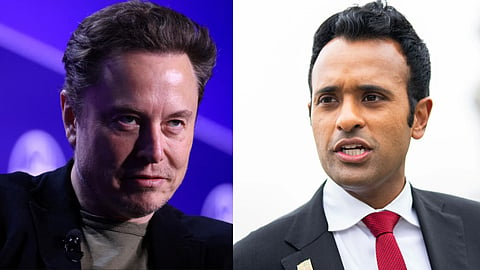
- NEWS
- the EDIT
- COMMENTARY
- BUSINESS
- LIFE
- SHOW
- ACTION
- GLOBAL GOALS
- SNAPS
- DYARYO TIRADA
- MORE

As part of the upcoming Trump administration, Elon Musk and Vivek Ramaswamy have unveiled their vision for the “Department of Government Efficiency” (DOGE), a newly created advisory board aimed at streamlining federal spending and bureaucracy. With lofty goals of cutting $500 billion annually, and Musk claiming potential cuts of up to $2 trillion, the initiative has sparked a mix of curiosity, skepticism, and controversy.
An ambitious mission
DOGE is set to focus on dismantling government bureaucracy, slashing excessive regulations, and restructuring federal agencies. In an op-ed for the Wall Street Journal, Musk and Ramaswamy outlined a three-pronged approach: regulatory rescissions, administrative reductions, and cost-saving measures. They emphasized targeting expenditures deemed unauthorized by Congress or misaligned with legislative intent.
Musk aims to reduce discretionary spending significantly, proposing cuts to entities like the Corporation for Public Broadcasting ($535 million annually), international grants ($1.5 billion), and progressive organizations such as Planned Parenthood ($300 million). “We must streamline government to align with congressional priorities while fostering efficiency,” Musk and Ramaswamy wrote.
The scale of the challenge
Critics argue that the $2 trillion reduction Musk envisions is impractical, given that most federal spending is mandatory, tied to programs like Social Security, Medicare, and defense. While targeting unauthorized expenditures, DOGE avoids mentioning larger areas like veterans’ health care or opioid treatment programs, which also fall under expired congressional authorizations.
Historically, attempts to overhaul government spending, such as President Ronald Reagan’s Grace Commission in the 1980s, have yielded limited results. Experts question whether DOGE will face similar challenges.
Conflicts of interest and ethical dilemmas
The advisory board’s mandate to address inefficiencies has raised ethical concerns, particularly given Musk’s businesses. Regulatory agencies like the Federal Trade Commission and the Securities and Exchange Commission, which oversee Tesla and SpaceX, are among those reportedly targeted for restructuring under DOGE’s vision. Critics worry this could create conflicts of interest, undermining public trust in the initiative.
The Musk-Bezos rivalry
Further complicating Musk’s role are his claims about rival billionaire Jeff Bezos, who allegedly advised people to sell Tesla stock, believing Trump’s election victory would harm Musk’s businesses. Bezos has denied these assertions, calling them baseless. This rivalry, already marked by their competition in the private space race, adds another layer of intrigue to Musk’s political involvement.
Public reactions and political implications
DOGE has drawn praise from fiscal conservatives eager to see government spending curtailed. However, progressives and some experts have expressed concern over its feasibility and the potential for hasty cuts to vital programs. Senator Elizabeth Warren criticized the initiative’s lack of clarity and questioned the authority of Musk and Ramaswamy to implement such sweeping changes.
Despite the backlash, Musk remains confident, calling DOGE “a necessary step toward a more efficient government.” President-elect Trump has also expressed his support, emphasizing Musk’s innovative approach as key to his administration’s goals.
While DOGE reflects the unconventional nature of Trump’s cabinet picks, it raises significant questions about practicality, ethics, and authority. As Musk and Ramaswamy push forward with their ambitious agenda, the initiative will serve as a litmus test for the Trump administration’s ability to reshape federal governance.
(Sources: Forbes, Wall Street Journal, CBS News)
